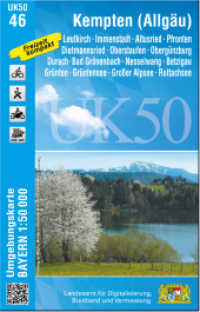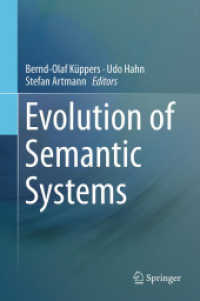- ホーム
- > 洋書
- > 英文書
- > Science / Mathematics
Full Description
The project of science has been to provide answers to questions about the world and how it works. Often, this lofty role has been characterised by a narrow and dogmatic scientific training, an unwillingness to communicate to differing stakeholder needs, a refusal to accept and to manage uncertainty, complexity and value commitments, and the reduction of knowledge assessment to colleague peer review on narrowly technical issues. Times have changed. As the world faces increasingly disparate challenges, science is subjected to increasingly vehement demands from a society calling for transparency, openness and public participation in science policy. Science is going through an evolutionary process. Perhaps the most painful process it has ever encountered.
Research on the interfaces between science and society is a burgeoning area. A new conception of knowledge now appears to be emerging, based on the awareness of complexity, uncertainty and a plurality of legitimate perspectives and interests. Democracy is extending into the previously quite exclusive scientific realm, and science must now submit to public scrutiny and participation in the governance of knowledge. This book provides much-needed reflections on the methods and tools for knowledge quality assurance, particularly on its inputs to extended policy and decision-making processes.
The overall aim is to improve the relationship between science and society. The discussion involves six themes: communicating between plural perspectives; accepting and learning how to manage uncertainty, complexity and value commitments; acknowledging new conceptions of knowledge; implementing transparency, openness and participation in science policy; valuing community-based research; and exploring how new ICT can support inclusive governance. Taken together, these themes provide both a framework and vision on how to conceive, discuss and evaluate the changes that are occurring. The chapters cover theory, practice, approaches, experiences, ideas and suggestions for a move beyond "talking the talk" to "walking the walk".
Science and policy interfaces are dynamic processes needing to permanently redefine themselves and their roles. This book contributes to the enrichment and deepening of our understanding of these important new trends in the social relations of science, which are fundamental to our understanding of the prospects for further progress.
The book will be essential reading for scientists, policy-makers, managers and the public.
Contents
Introduction
Sofia Guedes Vaz and Ângela Guimarães Pereira
1. When communication fails: A study of failures of global systems
Jerome Ravetz
2. Science for sustainable development: Articulating knowledges
Gilberto Gallopín and Hebe Vessuri
3. Reflexively dealing with uncertainty and complexity in policy-related knowledge: What can it mean?
Matthieu Craye
4. Uncertainty, assumptions and value commitments in the knowledge base of complex environmental problems
Jeroen Van der Sluijs
5. Science for governance: The implications of the complexity revolution
Mario Giampietro, Tim Allen and Kozo Mayumi
6. Reflexivity and modesty in the application of complexity theory
Roger Strand and Sílvia Cañellas-Boltà
7. Precaution as an invigorating context for scientific input in policy processes
Cato C. ten Hallers-Tjabbes, David Gee and Sofia Guedes Vaz
8. Why knowledge assessment?
Silvio Funtowicz
9. Deliberating foresight knowledge for policy and foresight knowledge assessment
René Von Schomberg, Ângela Guimarães Pereira and Silvio Funtowicz
10. Transparency, openness and participation in science policy processes
Maria Eduarda Gonçalves
11. Interfaces between science and policy for environmental governance: Lessons and open questions from the European Platform for Biodiversity Research Strategy
Sybille van den Hove and Martin Sharman
12. Patents at the interfaces among science, society and the law
Emanuela Gambini
13. Evaluating public and stakeholder engagement strategies in environmental governance
Jacquelin Burgess and Judy Clark
14. Community-based research
Jennifer A. Bellamy
15. Science and society in place-based communities: Uncomfortable partners
David Waltner-Toews, Ligia Noronha and Dean Bavington
16. Science shops as science-society interfaces
Henk A.J. Mulder, Michael S. Jørgensen, Laura Pricope, Norbert Steinhaus and Anke Valentin
17. Building knowledge partnerships with ICT? Social and technological conditions of conviviality
Martin O'Connor
18. CSLoTs: communication of science to non-scientific audiences. VGAS©: Exploration of energy, lifestyles and climate
Tiago de Sousa Pedrosa and Ângela Guimarães Pereira
19. Worldwide virtual network of practitioners working on science and society issues
Mercè Agüera Cabo and Ângela Guimarães Pereira








